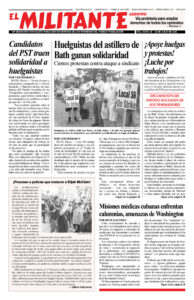The fight to defend women’s right to choose whether to have an abortion is a necessity for women’s emancipation and the line of march of the working class as a whole. The majority sentiment for this right, still the case even after decades of assaults, was registered June 29 when the U.S. Supreme Court overturned a Louisiana law that would have required abortion providers to have admitting privileges at a nearby hospital to practice. The 5-4 vote also registered the importance of working people continuing to look for ways to win and mobilize support for the right to choose.
While a similar law in Texas was in effect for three years before being struck down, half that state’s clinics were forced to close. Had the Louisiana law stood, the state would have become the seventh with only one clinic providing abortions.
Decriminalizing abortion was the product of growing working-class struggles in the 1960s and early ’70s. This included the Black-led proletarian movement that overthrew Jim Crow segregation, mobilizations against Washington’s war in Vietnam that changed attitudes in the working class and in the U.S. draftee armed forces, and the beginnings of a new fight for women’s emancipation.
Changing attitudes about rights and against discrimination are not the product of either legislation or rulings by nine black-robed “justices,” but of unity forged in struggle by working people. This is the way all social gains for the working class have been accomplished in the history of the class struggle.
Roe v. Wade was handed down while the political debate over the right of a woman to control her own body — tied to women’s ability to enter the workforce — had not yet been decisively fought out and won. It was an effort by the liberals on the court and beyond to bypass that fight and make new law themselves.
They did so by inventing a “right to privacy” you won’t find in the Constitution and linking it to so-called medical criteria, like the age of fetal viability and the need for a doctor’s consent after the first few weeks of pregnancy. From the outset, opponents of women’s rights took advantage of this cutoff of debate and the court’s decision to go after access to abortion.
State governments have adopted more than 1,200 laws erecting obstacles to abortion rights in the last 40 years — age restrictions, longer waiting periods, mandatory “counseling” on “alternatives,” and more.
Opponents have enacted state rules covering the size of procedure rooms, width of clinic corridors and other arbitrary requirements. These have nothing to do with a safe procedure. They are all aimed at making it harder for women to actually get an abortion.
These restrictions have taken a heavy toll. In nearly 90% of U.S. counties, with close to 40% of the country’s female population, there are no doctors or clinics that provide abortion. The burden falls hardest on working-class women and women in rural areas.
The political backlash from sections of the ruling class against decriminalization of abortion has been at the center of assaults on the gains of women. It’s an integral part of a broader class battle over the rights and living conditions of all working people.
Roe v. Wade decriminalized abortion, but did not amount to a victory for the right to choose. This political fight is still ahead of us. However, since the 1973 decision, the middle-class leadership of most women’s rights organizations has refused to mobilize the kind of political and educational fight needed. Instead, they tell us to focus on electing Democratic Party politicians who will help us out. This has been an unmitigated disaster.
We can win this fight, but it will take a radically different orientation. The fight for women’s emancipation is a crucial part of unifying our class along a working-class line of march to take political power into our own hands.
This will open the road to end every form of exploitation, degradation and bigotry inherent in capitalism, as well as the oppression of women inherited from millennia of class-divided society.

